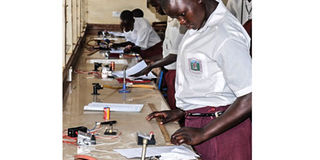Govt stuck with new curriculum over cash

Education. Senior Four students of Moroto High School conduct Physics practicals in 2017. PHOTO BY STEVEN ARIONG
What you need to know:
Cash diversion. Highly-placed sources say following approval of the budget, the Shs29b was instead re-allocated to increase capitation grants to schools under universal education
The roll-out of the revised lower secondary curriculum, which was expected to begin in February, next year, has been halted for the second time in three years over lack of money to implement it.
Education ministry in its 2019/2020 budget initially categorised the curriculum execution under “unprioritised activities”, but following line minister Janet Museveni’s intervention, Shs29b was internally allocated to it.
Implementation of the new curriculum, which has taken the government 12 years to review, is budgeted to cost Shs143b.
Highly-placed sources on Friday said following approval of the budget, the Shs29b was instead re-allocated to increase capitation grants to schools under universal education.
Increments
Now the central government will disburse Shs14,000 per Universal Primary Education (UPE) pupil, up from Shs10,000 while capitation grant per term per Universal Secondary Education (USE) student has been increased from Shs41,000 tot Shs55,000.
“We had prioritised rolling out the revised secondary curriculum next year, [but the funds were diverted and] we lost out because we had an undertaking with World Bank to increase capitation grants and non-wage [expenditure in secondary schools],” a senior Education ministry official said on condition of anonymity due to sensitivity of the matter.
Each secondary school the government plans to build will cost Shs2.1b, according to government computations.
Earlier, Mr Alex Kakooza, the Education ministry’s permanent secretary, said they plan to construct 117 secondary schools in sub-counties without any.
The PS confirmed that they had increased capitation grant to UPE and USE schools, effective July 1, when the new Financial Year begins.
“We have improved the capitation grants to UPE and USE schools,” Mr Kakooza said.
Ms Grace Baguma, the National Curriculum Development Centre (NCDC) executive director, said she is not aware of any pause in implementation of the curriculum and only anticipate re-tooling in-service teachers as possible hamstring.
“As far as I am concerned, the [Education] minister gave us a green light. We have done our part…the country should see that because we can’t roll out the curriculum when the teachers are not trained,” she said.
NCDC has already started printing new books to match the revised curriculum.
A 2016 NCDC plan to pilot the new curriculum in 20 schools was blocked after stakeholders, in a meeting with President Museveni, demanded retention of subjects instead of the eight learning areas that had been proposed.
The centre later slashed subjects to be taught from 43 to 20 out of which a student would be expected to choose a maximum of 15.
Approved
O-Level subjects.
English language
Literature in English
Mathematics
Biology
Chemistry
Physics
General Science (this will be an alternative to Biology, physics and Chemistry)
History and Political Education
Geography
Foreign languages
( French, German, Arabic, Latin, Chinese)
Local languages
Kiswahili
Fine Art
Religious Education
Performing Arts
Agriculture
Nutrition and Food Technology
Entrepreneurship
Physical Education
Information Communication and Technology (ICT) skills
Technology and Design




